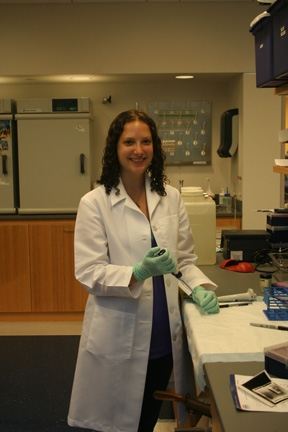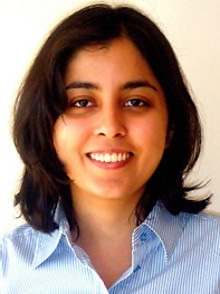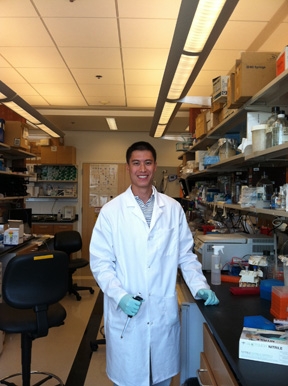David Roy has known for a long time that he wanted to be both an oncologist and scientist — even before he walked through Weill Cornell Medical College's doors.
Though not in the Tri-Institutional M.D.-Ph.D. Program, Roy committed early on in his medical education to spend at least one year in a lab performing dedicated research before he graduated. He got his wish, earning an invite last year into the prestigious Howard Hughes Medical Institute's Medical Research Fellows Program, which allowed him to take a year off from school to work in Memorial Sloan-Kettering Cancer Center researcher Dr. Timothy Chan's lab.

Sha-har Admoni
One year apparently wasn't enough for Roy. The Howard Hughes Medical Institute this spring renewed his fellowship for 2012-2013, and named Weill Cornell students Sha-har Admoni, Nipun Verma and Andrew Ji into the year-long program.
"I am extremely grateful to receive a second year of funding from the Institute," Roy said. "In a climate where medical student research funding is dwindling, I am happy to continue my research and training this upcoming year. It is my hope that this experience will contribute significantly to the necessary foundation on which to begin my career as a physician-scientist."
Roy, Admoni, Ji and Verma are among 70 students from 27 medical schools across the nation, selected from 226 and 68, respectively, to participate in the research fellows program, which is a $2.5 million annual initiative to increase the training of future physician-scientists.
The program allows medical, dental and veterinary students to pursue biomedical research at a laboratory anywhere in the nation except the National Institutes of Health campus in Maryland. More than 1,400 students have participated in the program since its inception in 1989.
Roy will continue to work with Dr. Chan to understand the genomic basis of tumor development and identify novel tumor suppressors and oncogenes. Through molecular and biochemical approaches, they aim to characterize mechanisms contributing to pathogenesis and validate the functional significance of candidate genes. Roy is currently working to better understand how PTPRD, a phosphatase, acts as a tumor suppressor in glioblastoma. In addition, he hopes to clarify the epigenetic changes in glioblastoma that take place in the presence of mutated IDH1.
Admoni will spend this year working with Dr. Leslie Vosshall at The Rockefeller University studying feeding behavior in flies. She will be looking at the role of certain peptides, which are also known to have analogs in humans, in regulating the amount of food that flies consume. This may ultimately allow researchers to better understand the genetic component of human diseases, such as obesity and anorexia nervosa.
Admoni applied for the fellowship as a way to learn how researchers approach unanswered questions in the science world — knowledge she hopes to apply in her clinical practice as a physician.

Nipun Verma
"I am honored to be chosen for this fellowship and excited to be in the lab this year," she said. "I hope to use the skills and knowledge I gain this year to unify the clinical and research aspects of my future career as a physician."
Throughout her medical school studies, Verma had been working in Dr. Danwei Huangfu's lab at Memorial Sloan-Kettering on a project that deals with the heterogeneity in differentiation between individual mouse embryonic stem cells. So, instead, of moving onto her third year of medical school, she will now work in Dr. Huangfu's lab full-time on her project while having greater exposure to researchers at Weill Cornell, Memorial Sloan-Kettering and Rockefeller, picking their brains on how they got to where they are.
"I am very grateful for this fellowship," she said. "It's now much more possible for me to be a physician and basic science researcher in the future."
Ji has been fascinated by research since his college days, finding the process of scientific discovery exciting, he said. He has engaged in a few projects since coming to Weill Cornell, but found his participation limited by the rigors of medical school.

Andrew Ji
"This fellowship was an opportunity to spend an entire year in the lab without having to worry about classes or clinical rotations," he said. "I wanted to be able to dedicate myself completely to a project, while receiving mentorship from someone whose career is in research."
He'll get to do just that this year, working with Dr. Joan Massague in his lab at Memorial Sloan-Kettering. Ji will be studying cancer cells that are resistant to molecularly-targeted chemotherapy. He will be discovering what genetic pathways they utilize to survive treatment, characterizing their interaction with treatment-sensitive cells and the surrounding microenvironment — this in order to learn how these resistant cells ultimately lead to recurrence of disease.
"It's a tremendous honor to have been selected for the fellowship," he said. "It's an incredible opportunity for me to immerse myself in the research aspect of medicine and learn from the best. I believe that future medical advancements will stem from close collaboration between clinicians and basic scientists, and I hope to be able to facilitate those interactions by having a solid understanding of the research world in addition to serving my role as a physician.
"I hope to be able to lead my own projects some day, so I believe that my medical training would have been incomplete without an experience like this."

